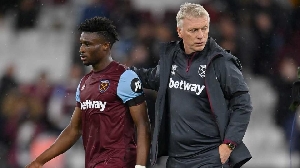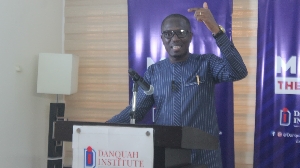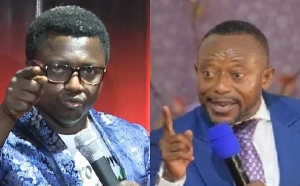Opinions of Monday, 9 October 2017
Columnist: Stephen Atta Owusu
Is Rawlings really the founder of the NDC?
Former president Jerry John Rawlings has never been happy with the performance of the NDC presidents that came after him, namely Atta-Mills and John Mahama as regards probity and accountability. He put excessive pressure on the two former presidents and accused them of incompetence. His criticisms drew him apart from the presidency.
Those who benefitted from the corrupt administration of the two presidents saw Rawlings as an enemy. Most of the time, the party held national and executive meetings and conferences without inviting Rawlings. Sadly enough, such attitudes of hatred by the top brass of the NDC have compelled Rawlings to do what he is doing. Observers from other parties felt that it was unfortunate to treat the founder of the party this way. But do his party members consider him as a founder?
Rawlings is generally considered as the founder of the NDC but, now and then, there are voices which challenge this view. A chief proponent of this view has been Obed Asamoah, a long-time member of Rawlings’ government in their military and civilian incarnations.
In an exclusive interview with Emera Appawu of Joy News, Obed Asamoah explained that when it was time to file the registration of the NDC, Rawlings was still in the Ghana Armed Forces so he could not have represented any district as a founding father. However, Dr Obed Asamoah explained that after the party had been set, a clause was fixed in the party's constitution to recognize the contribution of Rawlings to the ideals upon which the party was founded.
Obed Asamoah made this position even clearer in his memoirs: The Political History of Ghana (1950-2013) - The Experience of a Non-Conformist published in 2014, where he stated that the idea of founding the NDC was a collective one taken by a group to which Rawlings was not part of. The group saw Rawlings as the best person to lead the new party and approached him with the idea. Rawlings accepted. It is, therefore, clear that the initiative of forming the party did not come from Rawlings.
This can be compared with the formation of the CPP where the idea for the party germinated in the mind of Kwame Nkrumah who brought it into being, provided it with much of its ideological direction, singularly led it from its beginnings through all its glorious years and eventual demise. Today the CPP has been struggling without its revered founder. The NDC, on the other hand, has won elections even without Rawlings leading it.
The issue of who founded what can be a tricky one as we are seeing in the current debate about who founded Ghana. Even though Rawlings did not initiate the idea of forming the NDC from the remnants of the PNDC himself, he was the very personification of the party, at least in the initial stages. The party was built around him. It is doubtful if the party could have won the first two elections in the Fourth Republic without Rawlings leading it. That is why people generally regard him as the founder.
The same argument can be tweaked to apply to the foundation of Ghana. Even though the Gold Coast may have been in existence before Nkrumah burst on the political scene in the colony, the fact of our independence became personified in him. He was the very face of our independence and, by extension, the new nation.
That is why people associate the founding of the nation with him. It does not mean they think there were no others in the independence struggle. Nkrumah’s contributions were unique and it is easier for people to connect with an individual and accord him a symbolic status than with an amorphous group of persons each of whose contributions cannot be accurately gauged.
And so Rawlings is likely to continue being regarded as the founder of the NDC in the popular imagination, no matter what Obed Asamoah says. The question then becomes: is Rawlings trying to destroy what he created? But all of Rawlings’ bad-mouthing of his own party shows him in character. The pointing out of the ills of our society and the condemnation of others have been Rawlings’ trademarks as a public person since his first coup day speech on radio.
The party and Ghanaians, generally, have endured his antics. Now and then, they try to give it back to him. Now, it seems a section of the party hierarchy can take it no longer. Valerie Sawyerr’s outburst a few weeks ago is symptomatic of this feeling. Obed Asamoah quickly came to Sawyerr’s defence while others attacked her. Alhaji Bature has gone so far as to suggest that Rawlings should be sacked from his own party.
What particularly irks a section of the party hierarchy is what they think as his dancing with the ruling party when he gives Akufo-Addo a clean bill of health when it comes to corruption and threatening that his own party would not regain power even in 2020 unless it changes its ways. They point out (and other Ghanaians will agree) that the NPP itself, under the Kufuor government, was very corrupt and Akufo-Addo was part of that government and that Rawlings’ own life is not beyond reproach.
His wife has become rich from deals that are tainted with corruption, all his children received higher education abroad at great expense, he lives a lifestyle far above that of the ordinary Ghanaian who he claims to be fighting for and he received what is clearly bribe money from Abacha. He has also exhibited the greed that is characteristic of all African leaders and the political elite: becoming rich through the acquisition of political power. Rawlings has been calling on his party to return to its founding principles but he may not agree that the erosion of those principles started under his watch.
Of late there is the belief that he is losing his influence over the party and therefore his deliberate scheme of blame and vituperations are meant to destroy the NDC party.
The Rawlings family felt very much disturbed and frustrated by the kind of treatment meted out to them by the NDC top hierarchy. Mrs Rawlings took a bold step to move out of NDC and through her admirers a new platform called Friends of Nana Konadu Agyemang Rawlings (FONKAR) was created. She later did everything possible to form a new party. Even though she craftily chose a party name whose letters (NDP) were intended to confuse the illiterate voter because it sounded midway between NDC and NPP when they are pronounced or seen. It is believed that her intention of forming the party was not to win but to split the NDC votes. Did she succeed?
It is difficult to predict what the intentions of Rawlings are. Does he intend to obliterate the name of the party with which he has been associated from the political map of Ghana or is he just trying to make himself still relevant in Ghanaian politics? What he really intends to do lies within the womb of time.













